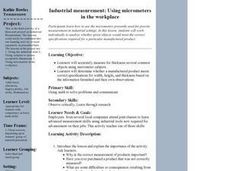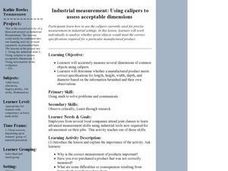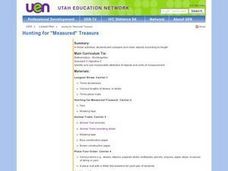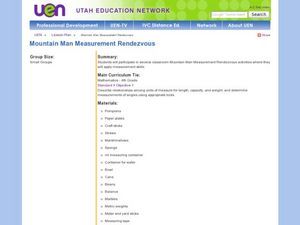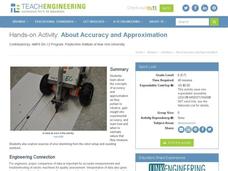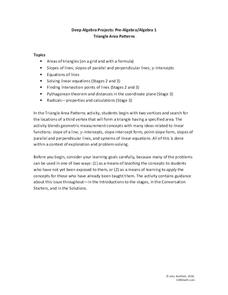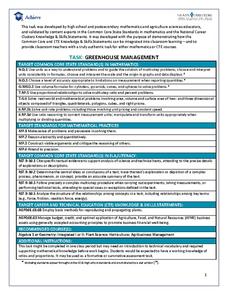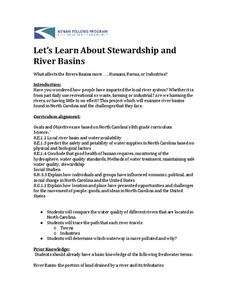Curated OER
Industrial Measurement: Using Micrometers in the Workplace
Students accurately measure several common objects for thickness using micrometer calipers. They work individually to analyze whether given objects would meet the correct specifications required for a particular manufactured product.
Curated OER
Industrial Measurement: Using Calipers to Assess Acceptable Dimensions
Students accurately measure several dimensions of common objects using calipers. They determine whether a manufactured product meets correct specifications for length, width, height, depth and diameter.
Curated OER
The Upper Palouse Restoration Project
Students become competent, to collect, record, and interpret information about a particular project they are undertaking. They apply the data and interpret them to analyze the environmental impact of a restoration project.
Curated OER
Wildflower Beautification Project
Students, in cooperative groups, design and create a wildflower garden for the community. They write letters to property owners requesting use of their land and then write invitations to their parents and to local, state, and federal...
Curated OER
Hunting for Measured Treasure
Pupils compare and contrast objects according to their length. In groups, they travel to different centers in their classroom to participate in different sorting activities. They are introduced to how to use a ruler and reading the...
Curated OER
Mountain Man Measurement Activity
Fourth graders discover the history of the Utah Mountain Men and utilize their math skills simultaneously. In this cross-curricular history and measurement lesson, 4th graders read about the Utah Mountain Men and the challenges they...
Curated OER
Measuring Sizes
Students explore the concept of scale. In this measurement lesson, students measure common classroom objects in order to help them better understand scale.
Curated OER
Math-Measurement
First graders examine measurement. In this measurement lesson, 1st graders practice using nonstandard units to help in measuring objects. Students listen to How Big is a Foot and complete an activity using unifix cubes to measure line...
Curated OER
Can You Measure Up?
Students use technology to visit websites where they play interactive games, gather information to complete activity sheets, and complete online projects. One lesson using 'Inch By Inch' by Leo Lionni, takes students to an interactive...
Curated OER
What Does the Sun Give Us?
Pupils study the sun and how solar energy works. To learn about renewable energy, they complete a lab activity using a pizza box as a solar heater. Quite clever!
Earth Day
Introduction To Scale Drawings
Real-life math is really great! In groups, learners measure objects in the classroom. After comparing measurements, they determine a scale and create a blueprint of the classroom. They discuss the purpose of using scale drawings in...
Alabama Learning Exchange
Polygon Perimeters
What are polygons? Learners find the perimeter of various geometric figures that the teacher has drawn in chalk on the sidewalk. A worksheet to record their measurements is provided. Get your third graders outside and exploring the world...
Curated OER
Graph Paper Patterns
Young artists divide a piece of graph paper into sections using rectangles, squares, and triangles. They then fill each section with patterns of shape and color. Elementary graders describe how their patterns are organized. Secondary...
Consortium for Ocean Science Exploration and Engagement (COSEE)
Ocean Acidification: Whats and Hows
Open this lesson by demonstrating the production of acidic carbon dioxide gas by activated yeast. Emerging ecologists then experiment with seashells to discover the effect of ocean acidification on shelled marine organisms. They measure...
Curated OER
Solar Electricity ~ The Colour Sensitivity of a Photovoltaic Cell
Teacher's notes, a materials list, detailed procedure, tips, and extension ideas are all included to make teaching this lesson on photovoltaic cells a sunny spot in your day! After some brief background reading, physical science...
Rochester Institute of Technology
Electrical Energy
My friend told me how electricity is measured and I was like Watt! In the hands-on activity, learners explore electricity by building circuits, both parallel and series. They also determine how increasing the number of light bulbs and...
Teach Engineering
About Accuracy and Approximation
How accurate are robots? Groups draw lines by moving robots backwards and forwards by one rotation of the wheels. Using the appropriate formula, they determine the percent error in the length of the lines in relation to the calculated...
5280 Math
Triangle Area Patterns
Combine algebraic and geometric strategies to find solutions. The task asks learners to find the coordinates of a third vertex of a triangle to create a triangle with a specific area. The project is a set of seven problems that helps...
Georgetown University
Cup-Activity: Writing Equations From Data
Determine how cup stacking relates to linear equations. Pupils stack cups and record the heights. Using the data collected, learners develop a linear equation that models the height. The scholars then interpret the slope and the...
Achieve
Greenhouse Management
Who knew running a greenhouse required so much math? Amaze future mathematicians and farmers with the amount of unit conversions, ratio and proportional reasoning, and geometric applications involved by having them complete the...
Kenan Fellows
Let's Learn About Stewardship and River Basins
What does it mean to be a good steward? Middle school environmentalists learn to care for their state's waterways through research, a guest speaker, and poster activity. Groups must locate and learn more about a river basin and the human...
Houston Area Calculus Teachers
Area and Volume
An AP calculus lesson begins with an activity to determine the volume of a solid using a cross-section. Next, learners review the ways to find the area between two curves , as well how to find the volume of a solid created from the...
Cornell University
Making a Battery
Don't be shocked when your class has a blast making their own batteries! Science scholars examine a dry cell battery, then design and construct a wet cell battery. The activity guides them through the parts of a battery, the variables...
EngageNY
Describing the Center of a Distribution
So the mean is not always the best center? By working through this exploratory activity, the class comes to realize that depending upon the shape of a distribution, different centers should be chosen. Learners continue to explore the...


